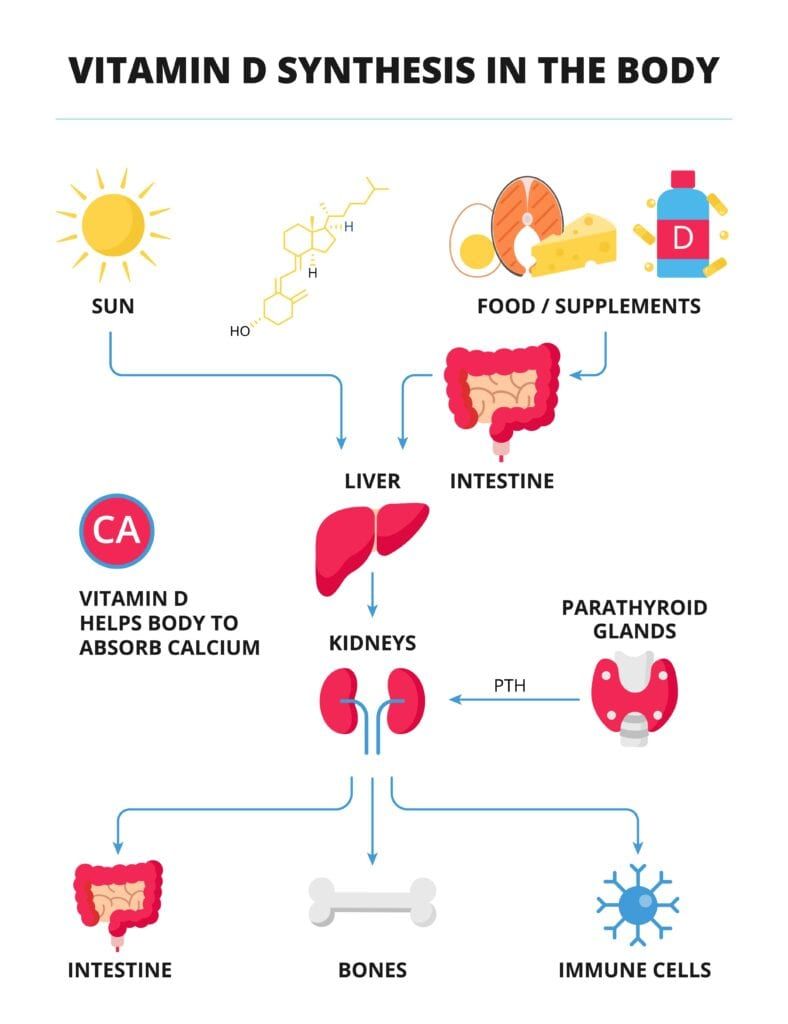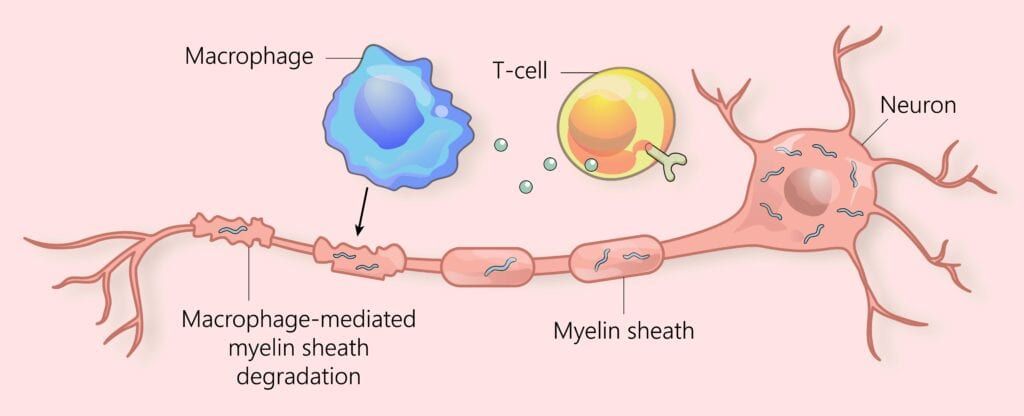Multiple Sclerosis (MS) is a disease that affects the central nervous system by disrupting signals between the brain and body. Currently, there is no known cause of MS and the progression of the condition is often unpredictable. However, every day researchers are bringing us closer to understanding this mysterious disease. Recently research has uncovered a possible relationship between vitamin D and MS after an observation was made that MS is more prevalent in places further from the equator with less sunshine. While the relationship between vitamin D and MS is still being researched, the hypothesis is that vitamin D can prevent or reduce the symptoms of MS. Let’s take a deeper look at this hypothesis and what it could mean for the future of MS treatment.
What is vitamin D?
Vitamin D, more formally known as calciferol, is a fat-soluble vitamin found in foods like fortified cereals, fortified milk, and fatty fish. It is also commonly known as the “sunshine vitamin” since your body can produce vitamin D when exposed to direct sunlight. Vitamin D is an essential nutrient that benefits the body in the following ways:

- Promotes calcium absorption through the small intestine
- Enables normal bone mineralization, growth, and remodeling
- Prevents muscle cramps and spasms
- Reduces inflammation
- Plays a role in cell growth, neuromuscular and immune function, and the metabolism of glucose
- Regulates mood and can improve depression symptoms
Unfortunately, as many as 41.6% of Americans are vitamin D deficient, meaning that they are not getting enough vitamin D. This is partially because sun exposure is the best way to obtain vitamin D, especially in relation to diet. However, it is hard to obtain vitamin D from the sun alone, especially if you live in an area with high pollution, wear sunscreen, spend most of your time indoors, or have dark skin. In fact, as many as 69.2% of Hispanics and 82.1% of African-Americans have a vitamin D deficiency since the pigments in dark skin minimize the amount of UV radiation the skin absorbs.
Being deficient in vitamin D can cause you to get sick more often, make you feel frequently fatigued, lead to depression, impair wound healing, cause bone and hair loss, and cause bone, muscle, and back pain. Recent research also suggests that a vitamin D deficiency may increase the risk of cardiovascular disease, as well as uterine, breast, prostate, and colon cancer. There has also been research that suggests a direct relationship between a vitamin D deficiency and the development of multiple sclerosis.
How does vitamin D affect the body, specifically in regards to MS?
Multiple sclerosis (MS) is an autoimmune disease, meaning that the body’s immune system ultimately causes the symptoms by attacking the protective sheath (myelin) that covers nerve fibers. Since nerves are responsible for relaying signals between the brain and body, disrupting the protective coating ultimately can cause nerve damage or deterioration. The results are a variety of symptoms such as numbness, weakness, tremor, lack of coordination, pins and needles sensation, and an unsteady gait. These symptoms generally follow a relapsing-remitting course, meaning that they occur during periods of days or weeks, then improve for a period of time.

In people with MS, the immune system identifies myelin as a foreign substance. As a result, the immune system produces types of white blood cells known as lymphocytes and macrophages. One particular type of lymphocyte, known as T cells, are essentially programmed by the immune system to eliminate myelin. These specialized white blood cells will travel through the bloodstream until they reach the “threat”. In the case of MS, this means that they will need to cross the blood-brain barrier (BBB) to reach the myelin in the CNS. Once the white blood cells cross the blood-brain barrier, they cause inflammation along the nerves that become known as lesions, or plaques.
Because vitamin D is associated with immune system processing, it is believed that consuming adequate amounts of vitamin D can decrease symptoms associated with MS. In fact, one study cited by John Hopkins University found that vitamin D may prevent lower the amount of T cells in the brain and spinal cord. The National Multiple Sclerosis Society also noted that people with a vitamin D deficiency were more likely to have MS attacks, as well as the development of new brain and spinal cord lesions. Although the exact nature of how vitamin D helps decrease MS symptoms is not yet clear, research is suggesting that appropriate vitamin D levels can be important in managing MS symptoms.
How much vitamin D do I need?
The amount of vitamin D you need is something that you should discuss with your doctor. This is because the recommendations vary depending on a number of factors and there is not always a one size fits all option. For example your age, latitude, amount of sun exposure, diet, and ethnicity can all impact your vitamin D needs. You can get vitamin D by getting at least 30 minutes of sunlight per day and eating foods that are high in vitamin D. However in many cases, sun exposure and diet may not yield enough vitamin D. In these cases, a daily vitamin D supplement is usually needed.
When it comes to vitamin D supplements, the National Institutes of Health (NIH) recommends consuming about 400-800 IU of vitamin D daily. Still, one study noted that at least 1,120 IU-1,680 IU is needed daily to maintain sufficient vitamin D levels, while another noted that people with a vitamin D deficiency may need to take 5,000 IU daily to reach sufficient levels. Additionally, some doctors say that patients with MS should consume more vitamin D than the average person, which can also affect your daily dosage. The bottom line is that you should work with your doctor to determine the dosage that is right for you.

Dr. Kashouty, a diplomate of the American Board of Psychiatry and Neurology (ABPN), practices general neurology with fellowship trained specialization in clinical neurophysiology. Dr. Kashouty finds the form and function of the nerves and muscles the most interesting part of neurology, which is what led him to specialize in neurophysiology with more emphasis on neuromuscular conditions. He treats all neurological diseases, but his main focus is to treat and manage headaches, movement disorders and neuromuscular diseases.




